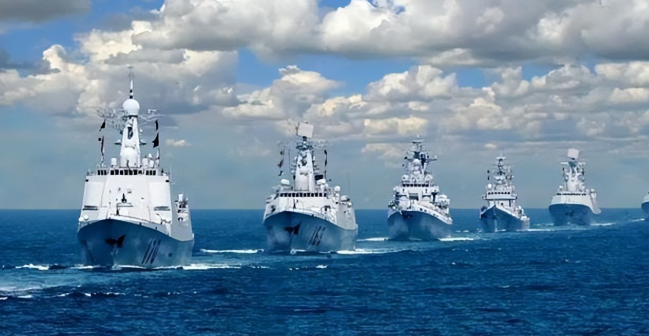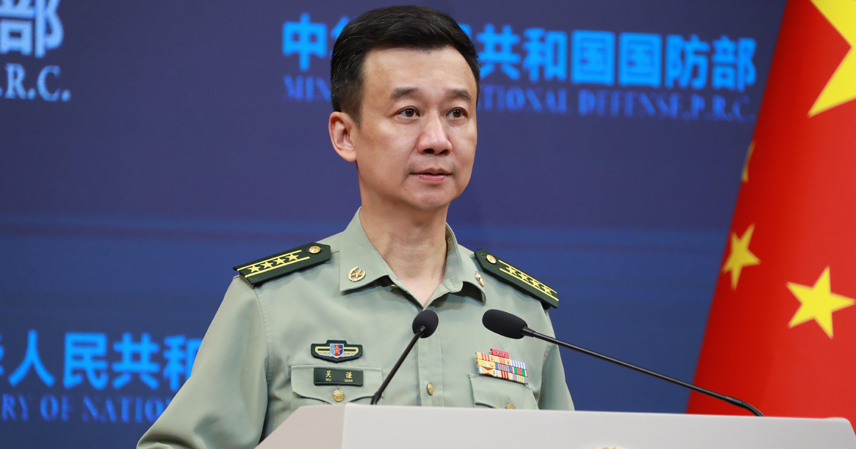In international relations, the shift in tone often reflects changes in strength.
Recently, China’s military has made several public statements that are particularly direct, with increasingly “hardcore” language, seemingly aimed at foreigners who don’t understand subtler communication.
Not only is the language tough, but the actions are also unrelenting. Many people are now saying: “The military is genuinely ‘impatient’ this time!”

The Confidence Behind China’s Change in Tone
The primary reason for the military’s change in tone is that China now possesses real and tangible strength. Without such strength, hard talk quickly becomes empty rhetoric. Now, with that strength, every statement is taken seriously.
In recent years, military strength has been solidly built and displayed. From aircraft carriers to large destroyers, from stealth fighters to anti-satellite technologies, and missile defense systems—it’s not just about quantity; quality continues to improve.
Previously, foreign critics would question whether the statements were genuine or mere “empty promises,” because they hadn’t witnessed China’s full capabilities. But that’s no longer the case.
The appearances of the Liaoning, Shandong, and Fujian aircraft carriers, the batch delivery of large destroyers, and the unveiling of new-generation strategic missiles like the globally-reaching DF-5C are results that would garner significant international attention on any military stage.

A recent example came on September 6, when Canada’s HMCS Quebec and Australia’s HMAS Brisbane provocatively transited the Taiwan Strait.
Colonel Shi Yilu, spokesperson for the Eastern Theater Command, made a direct statement: “The PLA Eastern Theater Command organized air and naval forces to monitor and guard the entire transit, effectively responding and handling the situation. The actions of Canada and Australia send the wrong signals and increase security risks.”
This response was straightforward, directly pointing out the provocative nature of the actions and emphasizing the PLA’s effective response, sending a clear message to the international community about China’s determination and ability to safeguard its sovereignty.
In June this year, the Chinese Ministry of Defense issued a rare bilingual statement, directly telling the U.S. “Do not deceive the American public and the international community.”
The brilliance of this approach lies in “preventing ignorance.” In the past, the U.S. often used the excuse of “not understanding Chinese” to deflect, but this time, China used English to ensure that the message was accurately understood.

The statement pointed out the U.S.’s annual tactic of hyping the “China threat,” followed by military spending justifications, and emphasized that “China’s development does not threaten any country,” directly addressing the so-called “America First” act.
On the South China Sea issue, the Ministry of Defense’s response has also become more direct. Recently, when responding to foreign military activity in the South China Sea, China stopped using “urge relevant parties to stop provocations” and directly named specific countries whose military aircraft and ships frequently enter the South China Sea, emphasizing that such actions are provocative and must stop immediately.
For international audiences, this approach leaves no room for confusion, delivering a clear message. Foreign parties no longer need to guess China’s intentions or bottom lines, which reduces the likelihood of misjudgment.

China’s Military Power Growing Since the Late 90s
Looking back, China’s military strength has been steadily growing. In the late 1990s, the Navy focused mainly on coastal defense, with smaller vessels and limited operational range. Now, long-distance naval training has become routine, and fleets can travel thousands of miles, covering multiple strategic directions.
The Air Force has also undergone a transformation. Long-range strikes were once theoretical in training, but now they are regular operational missions. The Army is accelerating its mechanization, informatization, and automation, and as these efforts accumulate, the methods of communicating externally naturally change.

Technological Advancements in Recent Years
In terms of technology, breakthroughs in hypersonic weapons, quantum communication, satellite navigation, and artificial intelligence have not only expanded the scale of China’s defense system but also upgraded its capabilities in coordinated combat.
These technological advancements have significantly improved the speed of military planning and response, meaning that when making statements, the military can now confidently assert, “We have the ability to respond.”
For instance, after global satellite reconnaissance systems provided comprehensive coverage, China could now state with certainty which developments it is tracking, giving a precise response to any emerging events. This level of precision forces adversaries to seriously assess the risks of their actions.

Another shift in China’s military spokesperson’s style is the use of rhetorical questioning.
When the Chinese naval fleet conducted live-fire exercises in the Tasman Sea, sparking reactions from Australia and New Zealand, the Ministry of Defense spokesperson directly asked: “Did Australian ships inform China before conducting activities near Chinese waters?”
This well-reasoned response makes it clear to the international community that China’s military diplomacy has gained significant influence. This change is not coincidental, but rather a natural result of the increasing strength represented by homegrown aircraft carriers, the bulk deployment of Type 055 destroyers, and breakthroughs in cutting-edge military technology.
China’s Role in International Security
In recent years, China’s involvement in international security affairs has garnered increasing attention. From participating in United Nations peacekeeping missions to conducting escort tasks, evacuations, and humanitarian aid, the military has demonstrated the image of a responsible global power.
When a country not only defends its sovereignty at home but also provides public safety services on a global scale, its stance naturally carries more credibility.

The Ministry of Defense’s statements are not only about emphasizing defensive determination but also conveying a position of maintaining international order and opposing provocations and disruptions.
Now, the Words of China’s Ministry of Defense Are Understood Globally
When some countries increase military presence around China, using vague language to express opposition becomes time-consuming and may be seen as a lack of resolve. Directness allows the other party to quickly assess the pros and cons and reduces the chances of misjudgment. This change reflects maturity.
Historically, every rising nation goes through a stage of moving from passive responses to actively shaping its destiny. China is now in the later stages of this process, and the shift in its diplomatic language is just one manifestation of this.

This internal confidence enables China to present its principles and bottom lines directly, without the need for excessive politeness to gain understanding.
To the outside world, this may be labeled as “hardline,” but from China’s perspective, it is a confident expression.
The shift in the military’s language is like a person growing from youth to maturity: the stronger the strength, the more straightforward the speech. This directness is not a lack of strategy, but rather a confident display based on strength.

From a broader perspective, this shift also reflects China’s evolving role on the international stage. As its strength grows, China is no longer just a follower of international rules but is gradually becoming a maintainer and shaper of international order.
This trend will continue, because in the rapidly changing international environment, clear signals and sufficient capability are essential to ensure security and stability. The military’s increasingly “impatient” tone is a true reflection of China’s growing confidence.



